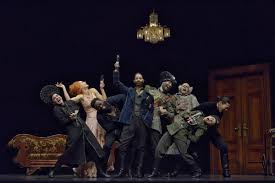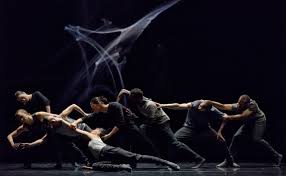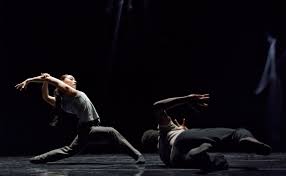


I saw Revisor last night with Holly. It’s the latest dance from choreographer Crystal Pite, with story by Jonathon Young. A Kidd Pivot production.
And it blew me away.
I’ve been a fan of Pite since seeing her award-winning Emergence at the National Ballet of Canada years ago (and I’ve seen it every year since when it’s on offer at NBC). It’s a ballet about insects in a hive and what is means to be part of a community. And it’s beyond fabulous. And … tattoos.
Revisor is an adaptation of Nikolai Gogol’s 1836 play, The Inspector General – a farce, a comedy, about the absolute corruption, oppression, greed, and tyranny within an unidentified “Complex” in the interior of Russia.
Revisor took me a while to get into. The first part of the performance is effectively a retelling or imitation of the play, with recorded dialogue and Russian costumes (and dance, yes). It tells the story of the people who operate the Complex and their purpose – holding prisoners, torturing dissidents, rounding up the masses. And their ultimate purpose is looking out for their own asses when they get word from a “trusted source” that an inspector from the “Centre” is coming to check them out.
After about 20 minutes of watching this story play out, I started to wonder what I had signed up for. A Russian farce about corruption and tyranny wasn’t really what got me out of the house on a Saturday evening (both Holly and I being homebodies on the weekends).
But then Revisor transformed (revised), brilliantly, into a dance performance showcasing the inner machinations of the creator who is adapting the Russian play for a modern audience. The female narrator, representing the creator (both Jonathan as writer and Crystal as choreographer and director, I assume), identifies the key figures in the story and its plot points and translates them into dance movements that drive the heart of the narrative, that reach into the heart of the characters’ motivations.
It reminded me of something very prosaic, but it’s the best analogy I have – the “reveal codes” function in WordPerfect. WordPerfect is a long-gone word processing program people my age used in the olden days; your document is displayed on screen, but with a command, you could “reveal codes” to see the coding behind your document’s formatting. That’s what Revisor did, it revealed the thought process behind transforming a 19th century Russian farce into a 21st century modern dance. It strips away the costumes, the dialogue, and the farce of the first part of the performance and lays bare the creativity and inspiration behind the dance. It stops being an imitation and becomes a very personal, beautiful, and affecting dance performance that, I think, is also an indictment of our modern world.
At one point towards the end of the “reveal codes” piece, the dancer who plays the character of the “subject” (the Revisor mistaken for the Inspector) is left alone on stage. Having learned about the atrocities at the Complex, her (yes, it’s turns out the Revisor is and always was a she, another revision) movements convey her pain. A moment very reminiscent of Heart of Darkness (the horror, the horror, said Kurtz).
The female narrator says repeatedly, as the subject moves about the stage in pain and confusion, the subject is moved. Meaning, the subject is physically moving, the subject is being moved and directed by the creator, the subject is emotionally moved by discovering these atrocities. And the subject is also the creator, moved by the original play and how it resonates in current times. You cannot watch Revisor without believing that it’s inspired by the venal corruption of Trump, his greed, and his debasement of democracy and all things decent.**
And it’s so clever. “Revisor” has so many meanings. First, it’s the Russian character from the original play – the “subject” who shows up at the Complex from the Centre and is mistaken for the titular Inspector. Actually, he’s not an Inspector at all; he’s a revisor – he’s there to change a comma in the Centre’s charter.
And then the creators fundamentally revise the play in the second part to create the “reveal codes” stripped down version of the story.
In the middle of the “reveal codes” piece, the creator also starts pausing – rethinking and editing her own creation – with the narrator chanting that she wants to make one “simple revision”. Again, it’s all about the process of creativity, honing and fine-tuning as one expects a great choreographer like Pite does again and again. The artistic process of determining, in a final piece of art, what stays and what goes.
I haven’t even touched upon the dance, the movements, the fluidity – and sometimes the scary spasmodic jerkiness. I realize I don’t even have a vocabulary to describe it – it’s transfixing. Jermaine Spivey was a wonder as the Postmaster Weiland, a bureaucrat who has seen and read too much and is literally being torn apart with the knowledge of everything that’s going on and not being addressed on the surface.
Last night was the last performance, I’m afraid. If it was on again tonight, I’d be trying to get rush tickets to experience it all over.
**As an endnote, if you really want to get scared about how bad it could get under Trump’s autocratic regime, read Graeme’s blog on how Trump is literally contemplating starting a civil war:
https://theneedlefish.com/2019/03/14/say-whos-up-for-a-good-ole-down-home-civil-war/
